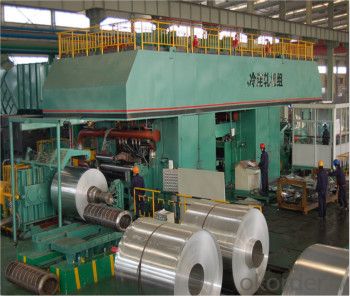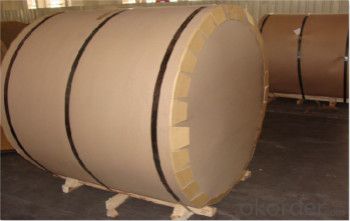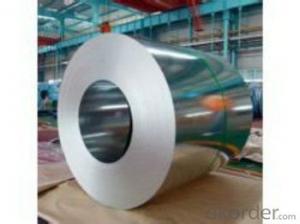Mill Finished Aluminium Coil AA3105 Temper H14
- Loading Port:
- Shanghai
- Payment Terms:
- TT OR LC
- Min Order Qty:
- 5 m.t.
- Supply Capability:
- 4000 m.t./month
OKorder Service Pledge
OKorder Financial Service
You Might Also Like
Item specifice
1. Aluminum Coil Description:
Aluminum coil, is a rolled product, produced in a coiled form of continuous strip, and having an ID (Inner diameter) and OD (Outer diameter).Common alloy coil are used for a wide variety of applications, alloy 1050, 1060, 3003, 3105, 3005, 5052, 5754, 5083, 6061, 8011, 8021, and so on, in thickness from 0.0065-7mm, in width from 300- 2200mm.
Aluminium coil can be deep processed into aluminium foilstock, aluminium circle, aluminium coating products, aluminium ceiling, aluminium plastic composite panel (APCP), aluminium embossed products, etc.
2.Main Features of the Aluminum Coil:
• Great ductility
• Heat conductivity
• Anti-corrosion
• Moisture resistanve
3.Aluminum Coil Images


4.Aluminum Coil Specification
Aluminum Coil/Sheet | |
Main Specification | |
Alloy | AA1xxx (AA1050, AA1060, AA1070, AA1100 etc.) |
AA3xxx (AA3003, AA3004, AA3005, AA3105 etc.) | |
AA5xxx, AA6XXX (AA5052,AA5083, AA5754, AA6061, AA6062 etc.) | |
AA8xxx(AA8011, AA8006, AA8079 etc.) | |
Temper | H14,H16, H18, H22, H24, H26, H32,O/F |
Thickmess | ≥0.2mm |
Width | 30mm-2100mm |
Standard | GB/T 3880-2006 |
Special specification is available on customer's requirement | |
5.FAQ
We have organized several common questions for our clients,may help you sincerely:
(1) How to guarantee the quality of the products?
We have established the international advanced quality management system, every link from raw material to final product. we have strict quality test; we resolutely put an end to unqualified products flowing into the market. At the same time, we will provide necessary follow-up service assurance.
(2) MOQ?
For trail order, we accept 5 MT.
(3) Payment term?
30% deposit, balance against the BL copy; 100% L/C at sight
(4) What is the delivery time?
Depends on actual order, around 30 to 35 days
- Q:Can aluminum coils be used for thermal insulation purposes?
- No, aluminum coils cannot be used for thermal insulation purposes.
- Q:How do aluminum coils contribute to improved indoor air quality?
- Aluminum coils play a crucial role in improving indoor air quality in various ways. Firstly, these coils are commonly used in air conditioning and HVAC systems, which are designed to circulate and filter the air inside buildings. The aluminum coils in these systems help in cooling and dehumidifying the air, reducing the moisture content that can promote the growth of mold and mildew. By controlling humidity levels, aluminum coils prevent the development of allergens and pollutants that thrive in damp environments, thus enhancing indoor air quality. Moreover, aluminum coils are highly efficient heat exchangers, allowing for effective transfer of heat between the air and the cooling or heating system. This efficiency enables HVAC systems to maintain a consistent temperature throughout the building, reducing the need for excessive energy consumption. By using less energy, these systems emit fewer harmful greenhouse gases, ultimately contributing to lower levels of outdoor air pollution and improving the overall air quality. Additionally, aluminum coils are durable and resistant to corrosion, which is essential for maintaining a clean and healthy indoor environment. The corrosion-resistant properties of aluminum coils ensure that there are no metallic particles or rust that can contaminate the air being circulated. As a result, occupants are less likely to inhale harmful particles that can cause respiratory issues and other health problems. Furthermore, aluminum coils are lightweight and often come with a protective coating, making them easier to clean and maintain. Regular cleaning of coils prevents the accumulation of dust, dirt, and other pollutants that may accumulate over time. By keeping the coils clean, the airflow is optimized, ensuring that the air being circulated is free from contaminants and allergens, thus promoting improved indoor air quality. In summary, aluminum coils contribute to improved indoor air quality by reducing humidity levels, preventing the growth of mold and mildew, enhancing energy efficiency, minimizing the emission of greenhouse gases, and maintaining a clean and contaminant-free air circulation system. These coils are an essential component of HVAC systems that play a vital role in creating a healthier and more comfortable indoor environment for occupants.
- Q:How are aluminum coils used in packaging?
- Aluminum coils are widely used in packaging due to their excellent properties and versatility. These coils are usually made from aluminum alloy, known for its lightweight yet strong characteristics. One common application of aluminum coils in packaging is in the production of aluminum cans. The coils are rolled into thin sheets, which are then formed into cans of various shapes and sizes. The lightweight nature of aluminum makes it ideal for manufacturing cans that are easy to transport and handle, reducing overall packaging weight. Aluminum coils are also used in the production of flexible packaging materials such as foils and laminates. These materials are commonly used for packaging food products, pharmaceuticals, and other perishable goods. The flexibility of aluminum allows it to be easily shaped and formed into different packaging formats, ensuring efficient and convenient use. Another important use of aluminum coils in packaging is in the production of closures and bottle caps. Aluminum closures provide an airtight seal, protecting the contents of the package from external factors such as moisture, contaminants, or oxidation. Additionally, aluminum closures can be easily opened and closed, providing convenience to consumers. Furthermore, aluminum coils are employed in the production of blister packs, which are widely used in the pharmaceutical industry. Blister packs consist of a plastic sheet with aluminum foil lamination, creating a barrier against moisture, light, and oxygen. This packaging format ensures the integrity and safety of pharmaceutical products by protecting them from degradation or contamination. In summary, aluminum coils are extensively used in packaging due to their lightweight, strength, and versatility. These coils are transformed into various packaging formats such as cans, flexible foils, closures, and blister packs, providing durability, protection, and convenience to both manufacturers and consumers.
- Q:What is the typical elongation of aluminum coils?
- The elongation of aluminum coils can vary depending on various factors, including the specific alloy and temper of the aluminum, the manufacturing process, and the intended application. However, aluminum coils generally have a high capacity for elongation. On an average basis, aluminum coils can stretch or deform by approximately 5-15% without fracturing or breaking. This is possible due to the inherent ductility of aluminum, which enables it to be easily shaped and formed without compromising its structural integrity. The elongation of aluminum coils plays a significant role in multiple industries, such as construction, automotive, and aerospace, where the material is commonly utilized. This characteristic allows for efficient fabrication procedures, including bending, rolling, and stamping, to create intricate and precise shapes. It is important to highlight that the elongation of aluminum coils can be further enhanced through the incorporation of specific alloying elements and heat treatments. These processes can improve the material's properties, making it even more suitable for demanding applications that require exceptional strength, ductility, and elongation capabilities. To accurately determine the elongation properties for a specific application, it is crucial to consider the particular alloy, temper, and manufacturing processes involved. In conclusion, while the typical elongation of aluminum coils ranges from 5-15%, a comprehensive evaluation of these factors is necessary.
- Q:What are the potential drawbacks or limitations of using aluminum coils?
- Using aluminum coils has several potential drawbacks and limitations. Firstly, aluminum is a softer metal compared to materials like copper or steel, making the coils more susceptible to damage such as denting or bending, especially in high-impact environments. Additionally, aluminum is prone to corrosion, especially in harsh or corrosive surroundings, which can negatively affect the coils' performance and lifespan. Another limitation of aluminum coils is their lower thermal conductivity in comparison to copper coils. This means that aluminum coils may not transfer heat as efficiently, resulting in decreased cooling or heating performance in certain applications. Moreover, the lower thermal conductivity may lead to higher energy consumption as the system needs to work harder to achieve the desired temperature. Furthermore, when aluminum coils are used in HVAC systems, compatibility issues can arise with specific refrigerants. Aluminum can react with certain refrigerants, causing corrosion or other chemical reactions that could compromise the coils' performance and longevity. Therefore, careful consideration and compatibility testing are necessary when selecting a refrigerant to use with aluminum coils. Lastly, the cost of aluminum coils can be higher compared to other coil materials. Although aluminum itself is relatively inexpensive, the manufacturing process for aluminum coils can be more complex and costly, impacting the overall product cost. Despite these drawbacks, aluminum coils are still widely utilized in various industries due to their lightweight nature, good electrical conductivity, and resistance to certain types of corrosion. However, it is crucial to thoroughly evaluate the specific application, environment, and requirements before choosing aluminum coils to ensure they are the most suitable option.
- Q:Can aluminum coils be used in the production of architectural façades?
- Yes, aluminum coils can be used in the production of architectural façades. Aluminum is a popular material choice for façades due to its durability, lightweight nature, and aesthetic appeal. The use of aluminum coils in façade production allows for easy customization, as they can be easily formed and shaped into various designs and profiles. Additionally, aluminum is resistant to corrosion, making it suitable for exterior applications. It also offers excellent thermal and acoustic insulation properties, contributing to energy efficiency and soundproofing. Overall, aluminum coils provide a versatile and efficient option for the production of architectural façades.
- Q:Are there any specific guidelines for the storage of aluminum coils?
- Yes, there are specific guidelines for the storage of aluminum coils. Aluminum coils should be stored in a dry, well-ventilated area to prevent moisture buildup and corrosion. They should be stacked horizontally on a level surface, with proper support to avoid deformation. Additionally, it is recommended to cover the coils with a protective material, such as plastic or cloth, to prevent dust, dirt, or other contaminants from accumulating on the surface.
- Q:What is the maximum width of aluminum coils?
- The maximum width of aluminum coils is subject to variation based on several factors, including the manufacturing process, the specific grade and type of aluminum, and the capabilities of the equipment employed. Nevertheless, in broad terms, the maximum width of aluminum coils can span from a few inches to multiple feet. Industrial coil lines ordinarily possess the capacity to handle widths up to 72 inches, whereas specialized machinery might be capable of accommodating even wider coils. To ascertain the precise maximum width applicable to a specific application, it is crucial to consult with the manufacturer or supplier.
- Q:How are aluminum coils used in the production of beverage cans?
- The production of beverage cans relies heavily on aluminum coils, which serve as a critical component. These coils, essentially flat and thin aluminum sheets, are wound into a coil shape. To begin with, the aluminum coils undergo unwinding and are fed into a machine that applies a thin layer of protective material, typically a polymer. This coating serves to prevent any interaction between the aluminum and the beverage, thereby preserving its taste and quality. Subsequently, the coated aluminum coils pass through a series of rollers that gradually shape them into a cylindrical form. This process, known as cupping, involves transforming the flat coil into a cup-like shape, which ultimately becomes the body of the beverage can. Once the cups are formed, they undergo trimming to achieve the correct height and diameter. To minimize waste, any excess aluminum is recycled. Following this, the cups are cleaned and rinsed thoroughly to eliminate any impurities. After the cleaning process, the cups are conveyed through another machine that applies a liquid compound to their inner surface. This compound acts as a barrier, preventing any potential reactions or contamination between the aluminum and the beverage. Following this step, the cups are shaped into the final can body by being pressed between a top and bottom mold. These molds are designed to give the cans their distinctive shape and ridges. Any excess aluminum is trimmed off, and the cans undergo another round of cleaning to ensure their purity. Finally, the cans are sent for filling with the desired beverage, sealing, and labeling. Once these processes are completed, the cans are packaged and dispatched for distribution. In conclusion, aluminum coils are an essential element in the production of beverage cans, providing the raw material from which the cans are made. Through a sequence of procedures encompassing coating, cupping, shaping, and cleaning, the aluminum coils are transformed into the final can bodies. These cans are then filled, sealed, labeled, and prepared for consumption.
- Q:What are the different coil slitting options available for aluminum coils?
- Aluminum coils can be slit in several ways to meet specific requirements and achieve desired outcomes. 1. The most common method is single-loop slitting, where the coil is fed through rotating circular knives to make a single cut along its length. This creates narrower coils with the desired width. 2. Double-loop slitting is similar to single-loop slitting, but the coil is passed through the circular knives twice, resulting in two narrower coils. This method is preferred when precise width tolerances are necessary. 3. Rotary slitting involves feeding the coil through rotating knives that make multiple cuts simultaneously. This allows for the production of numerous narrow strips in one pass, making it ideal for high-speed production. 4. Crush cutting utilizes opposing circular knives, with one stationary and the other rotating. The knives crush and shear the aluminum coil, providing precise slitting. This method is suitable for thin coils and applications that require minimal burr. 5. Shear slitting uses upper and lower straight knives to cut through the coil. The knives move in opposite directions, creating a shearing action that produces clean and accurate slits. This method is preferred for thicker coils. 6. Laser slitting is a modern and highly precise method that employs a laser beam to make cuts in the aluminum coil. It offers exceptional accuracy and clean edges, making it suitable for high-end applications with strict tolerances. Each of these coil slitting options possesses distinct advantages and is selected based on factors such as required width tolerances, coil thickness, production speed, and desired edge quality. Manufacturers choose the most appropriate method based on their specific needs and the characteristics of the aluminum coils they work with.
1. Manufacturer Overview |
|
|---|---|
| Location | |
| Year Established | |
| Annual Output Value | |
| Main Markets | |
| Company Certifications | |
2. Manufacturer Certificates |
|
|---|---|
| a) Certification Name | |
| Range | |
| Reference | |
| Validity Period | |
3. Manufacturer Capability |
|
|---|---|
| a)Trade Capacity | |
| Nearest Port | |
| Export Percentage | |
| No.of Employees in Trade Department | |
| Language Spoken: | |
| b)Factory Information | |
| Factory Size: | |
| No. of Production Lines | |
| Contract Manufacturing | |
| Product Price Range | |
Send your message to us
Mill Finished Aluminium Coil AA3105 Temper H14
- Loading Port:
- Shanghai
- Payment Terms:
- TT OR LC
- Min Order Qty:
- 5 m.t.
- Supply Capability:
- 4000 m.t./month
OKorder Service Pledge
OKorder Financial Service
Similar products
New products
Hot products
Related keywords




























